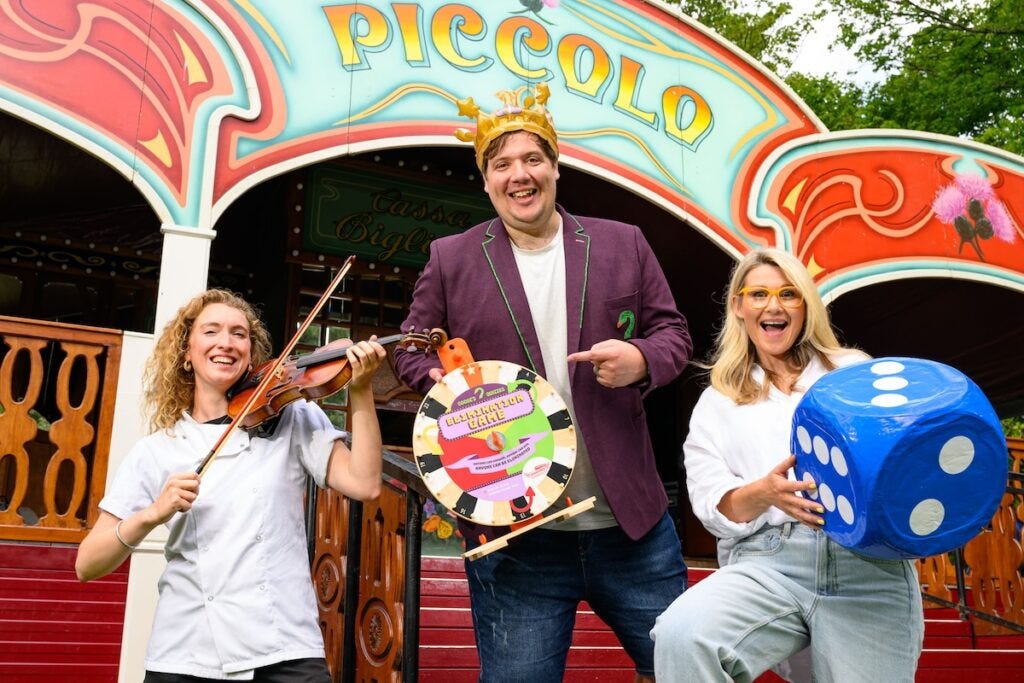Five things you need to know today
Funding for charities available from LNER, fun in George Square about to begin - and a money saver on Fringe tickets
At Edinburgh Sculpture Workshop from tomorrow
Edinburgh Sculpture Workshop is delighted to present Love in the Ecotone, an installation of new work by Megan Rudden for the Hawthornvale Space from tomorrow until 12 October 2025.
The Ecotone describes a transitional space between two environments, a boundary that does not separate but rather intimately connects different systems. Rudden’s cast and carved and scattered materials, consider the material world through words and watery relations. Liquid metaphors that develop connections between sculpture, language and the body. The gallery becomes a meeting ground where these concepts interact, and transform. Through the tensions and flows within this complex space of intersection, new structural properties and meanings emerge, reshaping all systems in the process. Slippery materials, salt, water, resin, mothers' milk, acrylic and words, flow through the ecotone reflecting and becoming, taking form for a moment only to dissolve, creating a temporary overlap between states. Drawing from Astrida
Neimanis’ essay ‘Hydrofeminism: Or, On Becoming a Body of Water’, at the heart of the installation is the body in fluid form, a fundamental part of the natural world, neither separated from, nor privileged to it.
Although held within perceivably rigid structures, the body continues to ebb and flow, repulse and attract, drawing out and activating the potentials, connections and actions, as we relinquish any lingering illusion of separation.
Rudden has also produced a new piece of writing to sit alongside this installation. The exhibition text becomes another site to explore the interactions between words and the material world. Reflecting also on her experience of becoming a mother, Rudden considers how pregnancy, birth and child raising can act as a microcosm through which to examine our watery connections to both inner and outer worlds.
Megan Rudden is an artist and writer from Leith, currently based in Glasgow. Her interdisciplinary practice moves across performance, object making, text and drawing. She is a recent graduate of MLitt Art Writing at Glasgow School of Art.
The exhibition will be on view at Edinburgh Sculpture Workshop from 18 July to 12 October 2025. Megan Rudden’s exhibition is viewable from the street every day between 7am and 7pm.
Free, no booking required.

Offer for local residents from Assembly
As George Square Garden opens on Friday for the Folk and Food Festival Assembly Festival is offering some Fringe tickets for £6.50 each.
A spokesperson said: "From fan favourites and rising stars to the wonderfully weird. There’s something for every kind of Fringe fan at Assembly Festival. This special offer is valid for performances running from 30 July to 3 August and there is a strictly limited ticket allocation, so get in quick!"
George Square Garden from Friday
From Friday there will be ten days of world-class music, global food flavours and community connection at Assembly Festival’s free to enter event in George Square Gardens. Folk & Food Festival combines the best of Edinburgh’s culinary scene with a bold new folk music line-up, taking over the Garden’s iconic Palais du Variété Spiegeltent and the new Piccolo Kitchen. Headline performers include inimitable Scottish fiddler and composer Duncan Chisholm, genre defying The Unthanks, contemporary folk group The East Pointers, and folk royalty Eliza Carthy & The Restitution, alongside talks from food industry professionals, a producers' market, hands on workshops and live cooking demonstrations in the heart of the city.

Charity funding
An Edinburgh-based charity which secured vital funding from LNER is encouraging other good causes to do the same.
LifeCare Edinburgh supports older people living with dementia, and their carers. The charity’s ‘Caring Connections’ project received funding from the LNER Customer and Community Investment Fund, enabling them to help more than 180 people over the past year.
LNER is now accepting applications for 2026 funding. Small and medium-sized charities looking to deliver projects aligned with three key LNER values - better for planet, better for people and better for places are being encouraged to apply.
Awards of up to £10,000 are available to organisations based within 15 miles of the East Coast Main Line. Projects which help people develop skills, improve employment prospects, protect the environment, encourage sustainability, promote better mental health and benefit local communities have all previously received funding. The application window is open until 25 August 2025.
Seldom listened to voices are important in health and social care
Clubs, schools, day centres and other community settings could help to make health and care more accessible, new research has suggested. Familiar places like these could remove barriers to care, such as not being sure if there is a health or care issue, where to go, how to get there, who to see or what to tell the health or care practitioner.
This is one of more than 20 recommendations made by people in the UK who researchers say are rarely consulted about the design of health and social care services.
A new report coins the term ‘seldom-listened-to’ to describe these people and communities. The researchers also coin the term ‘health labour’ to describe the effort needed by seldom-listened-to people to access health and care.
The report, titled Designing the future of care with seldom-listened-to people, encompassed ten projects across the UK, from Kent in south east England to the Highlands and Islands.
“The people in our study are from communities which aren’t often listened to or included in discussions about the design of health and care services,” explained Professor Mary Stewart, academic lead for the project and Director of Social Interaction, Mental Health and Wellbeing at Heriot-Watt University in Edinburgh. “And yet these communities can experience profound health and care inequalities that can impact on their physical and mental health, quality of life, and the ability to live well – not only for the individual – but also their families and the wider community.
“Our research sets out the specific ways in which staff, organisations, stakeholders, and policymakers can place seldom-listened-to individuals and communities at the heart of the design of the future of health and care.
“We show not only that this is possible – but that it’s vital to co-design the future of health and care with these people and communities to improve health and care for everyone.”






